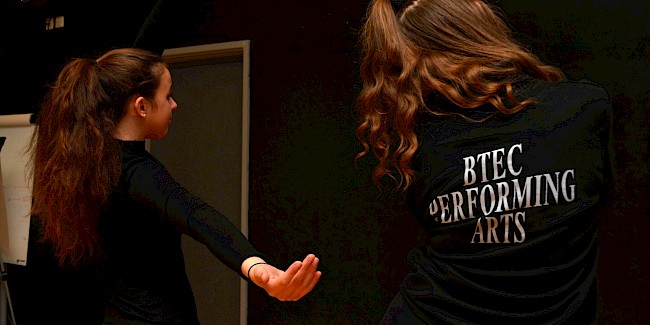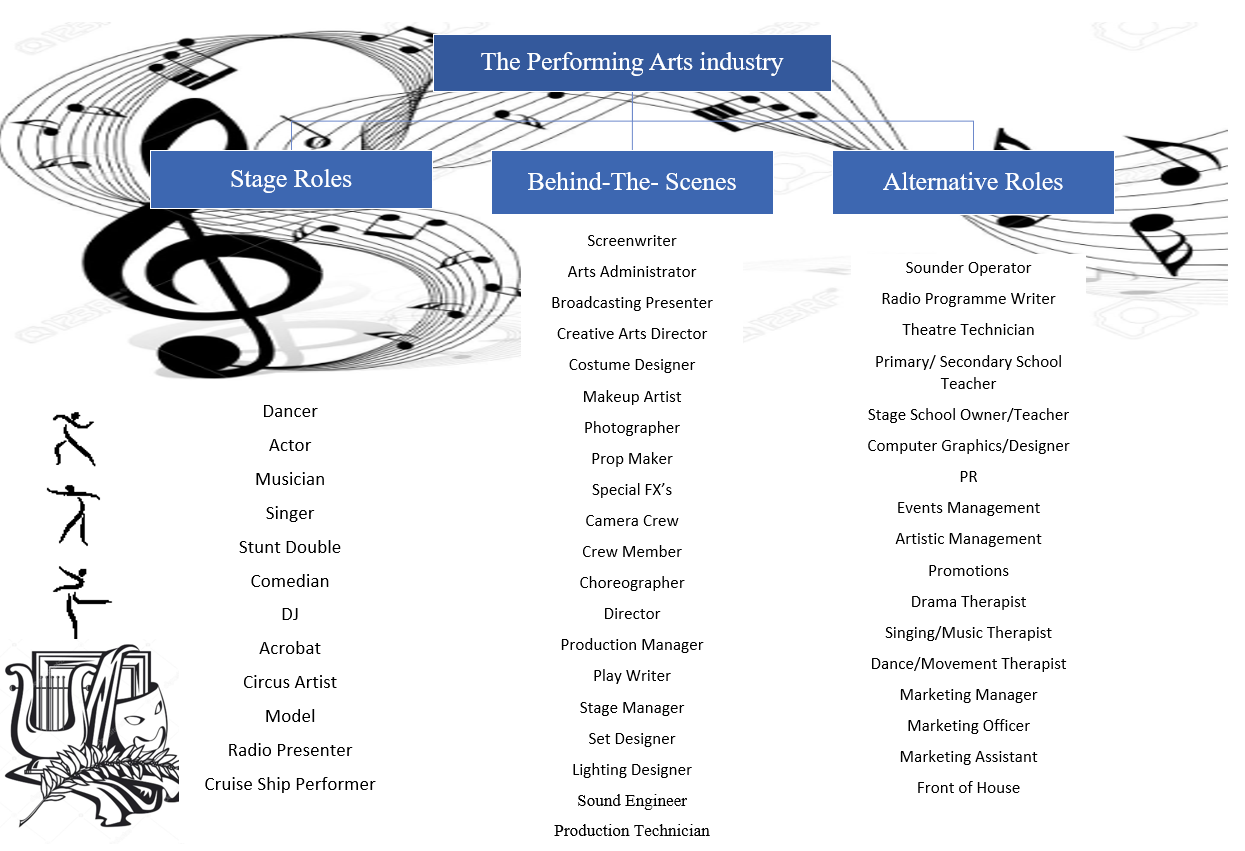Curriculum Structure (Overview)
Performing Arts at Key Stage 3 – Year 7 & 8 |
|---|
| Overview | Studying cultural education subjects, such as dance, drama and music, sparks creativity across the curriculum. We encourage students to be inquisitive, disciplined and determined. Within year 7 and year 8 students work on a carousel. They will study each discipline twice within the Academic year. This will give students insight on all pathways and topics within the Performing Arts. Students will build on their confidence, creativity and organisation. |
| Dance | Within Dance students, study a wide range of different genres. This encourages students to step outside the box, learn about different cultures and practitioners and challenges them within their learning. Students will work within groups and will perform their work created. They will be assessed each term in the following areas; Understanding, Creativity, Performance and Evaluation. Topics students will be studying within dance are; Dynamics, Contact, African, Musical Theatre, Hip Hop and Contemporary. These topics are focused on practitioners within each genre and allow students to build on their subject knowledge as well as their choreographic skills. |
| Drama | Similarly to Dance, Drama will also cover a wide range of topics to develop students understanding of stage acting, screen acting and the history of. Students will engage in; film trailers, pantomime, scripts, musical theatre, mime, animal studies and Brecht. Students will be assessed in the same areas however acting will have a more tailored pathway. |
| Music | Music is a universal language that embodies one of the highest forms of creativity. Music should engage and inspire students to develop their love and passion for music and their talents as musicians. Music builds on self-confidence, hand eye coordination, creativity and self discipline. It allows to students to express themselves in different ways other than speaking. Some of the topics studied in music are; Building blocks, keyboard skills, Britpop, African fusion, Evolution of music, samba and Jazz. This will develop a foundation of understanding of performance, composition, structure and Instrumentation. |
Performing Arts at Key Stage 3 – Year 9 Structured pathway |
|---|
| Overview | The Performing Arts curriculum prepares students to become independent and creative individuals. Subjects promote an overall appreciation of the arts both inside and outside of the classroom developing discipline, control and focus allowing them to grow into well rounded adults. Within year 9, students will rotate within three areas; Performing Arts, Arts Award and Music. This will allow students to get experience in all areas and have a wide range of knowledge and understanding about the Arts, not only on stage, but behind the scenes. This pathway allows students to have a real insight on careers within the Arts and have an in depth understanding about there this could lead them in the future. At the end of Term 3, students will be set into 3 different groups which will give opportunity for students to have a deeper understanding and foundation on a possible chosen subject for Key Stage 4. |
| Performing Arts | Within the Performing Arts pathways, students will be studying a wide range of practitioners. They will look at the history of how that practitioner became who they were and what they are known for, the style and genre of that practitioner and look at performance works. Students will study musical theatre as a whole and will have insight on Dance, Drama and Music both separately and as one. Students will also be assessed on both practical and theory work within this area. |
| Arts Award | Arts Award’s mission is to support young people to enjoy the arts, to connect with and take part in the wider arts world, and develop creativity, communication and leadership skills. Students will take part in challenges in an art form, participate in arts activities, experience arts events and become inspired by artists. Arts award reflects many different interests and ambitions, encourages individual development and helps young people to define their creative futures. Within this pathway students will possibly be awarded with Bronze Arts Award and Silver Arts Award status, Managed by Trinity College London. |
| Music | Within the Music pathway, students will be studying the theory behind music. They will be deepening their knowledge, looking at the history of practitioners, music styles, the wide range of instruments and the commonalities in music then with music we hear today. Students will be looking at the theory of music including; notation, composition, music theory and harmony along side the music technology route such as; Managing a music product, live sound, recording and programme music. This will allow students to establish where their strengths are within music and will encourage them to take the next time within key stage 4. |
Pearson BTEC Level 2 Tech Award in Performing Arts
To study Performing Arts at Key stage 4 you must be prepared to take part in practical lessons and workshops as well as performing both within a group and at times, on your own as a solo performance.
Component One – Exploring the Performing Arts (Internal)
- Exploring practitioners works
- Understanding how a final product is made
- Creating a performance piece within a group
- Written portfolio and final practical performance
Component Two – Developing Skills and Techniques within the Performing Arts (Internal)
- Exploring techniques within Dance, Acting and Musical theatre
- Understanding the way they are both separately and as one
- Analysing your own practice and understanding the importance of self-discipline
- Written portfolio and final practical performance as either a solo or in a group
Component Three – Responding to a brief (External)
- Responding to a brief and exploring different ways to do so
- Developing an idea and embedding the techniques learned within the course
- Creating a final performance for a live audience
- Brining both all components together and incorporating all that has been learned
- Written exam, split into three parts; Ideas log, skills log and a final evaluation as well as a final live group performance
Pearson BTEC Level 2 Music (First)
Students who wish to study music at Key stage 4 must play at least one instrument, be able to read music at a basic level and be prepared to perform in both a group setting and as a solo
Units covered within this course are:
Unit 1 – The Music Industry (External)
Unit 2 – Managing a Music Product (Internal Synoptic)
Unit 3 – Introducing Live Sound (Internal)
Unit 5 – Introducing Music Performance (Internal)
Pearson BTEC Level 3 Extended Diploma in Performing Arts
This qualification is equivalent to 3 A levels. Students taking on this course, will be studying all elements of the performing arts, looking at different genres and styles as well as techniques and disciplines. Students will be performing within small groups as well as a solo performer. This course is about the developmental stage as you as an individual. This course is treated as a college course, you will have the opportunity to engage with and learn from people currently in the industry and will experience what it is like to take this on as a career.
Unit 1 – Understanding Practitioners work (External)
Unit 2 – Developing Skills and Techniques for Live Performance (Internal)
Unit 3 – Group Performance Workshop (External)
Unit 4 – Performing Arts in the community (Internal)
Unit 5 – Individual Performance Commission (External)
Unit 6 – Final Live Performance to an Audience (Internal)
Unit 7 – Employment opportunities in the Performing Arts (External)
Unit 19 – Acting Styles (Internal)
Unit 20 – Developing Voice for Performance (Internal)
Unit 22 – Movement in Performance (Internal)
Unit 24 – Children’s Theatre Performance (Internal)
Unit 25 – Sites Specific Performance (Internal)
Unit 27 – Musical Theatre Techniques (Internal)
Pearson BTEC Level 3 National Extended Certificate in Music Performance
Students will develop their understanding of music theory as well as how music performances are created.
Students will take on board a independent learning approach and this will be tailored specifically to the individual. This course is designed for students who play an instrument, including the voice, at a high level, can read music and are prepared to perform in front of a live audience both within a group and as a solo performer.
Unit 1 – Practice Music Theory and Harmony (External)
Unit 2 – Professional Practice in the Music Industry (External)
Unit 3 – Ensemble Performance (External)
Unit 6 – Solo Performance (Internal)



